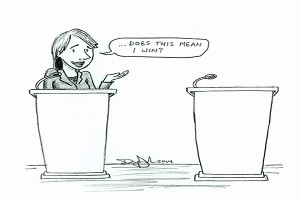There is officially one student running for ASNMU president, which means there is not so much an election this year, but the novel semblance of one. Millennials are just disappointingly disengaged from pertinent processes. It will then be unsurprising when students do not vote in droves, but in handfuls.

What will the future of national, state or municipal democracies look like when even student governments garner scant constituent attention? Will important elections be determined by default, as in the ASNMU 2014 case?
The trope that those who don’t vote can’t complain may be precise. Even if the one candidate proves to be benevolent and democratic in approach, that individual’s tenure is democratically illegitimate.
By and large, campus issues are not globally or even regionally implicated. But they are personally and politically implicated. Historically, they are the difference between greater societal inclusion and continued discrimination.
Campuses are laboratories for a society’s future. And NMU’s has a deficit of concern, emblematic of older generations’ myriad critiques of our own. Self-fulfilling prophecies and stereotypes are pitiful.
But why even grumble? Evidently, millennials have little inclination to foster a strong democratic voice. Whether it is Twitter, Snapchat or general narcissism, this generation of future policymakers shows little tendency toward democratic involvement.
What it does show is comfort in convenience. So long as campus changes are not drastic enough to notice, engagement beyond complaint by Tweet is exhausting.
Students must get out. Students must vote. Students must care.
The NMU student body will live with the consequences of nil participation. Students will manage to begrudge campus decision makers for their policies, particularly in a coming academic year characterized by adjustment. Or maybe students won’t notice.





















